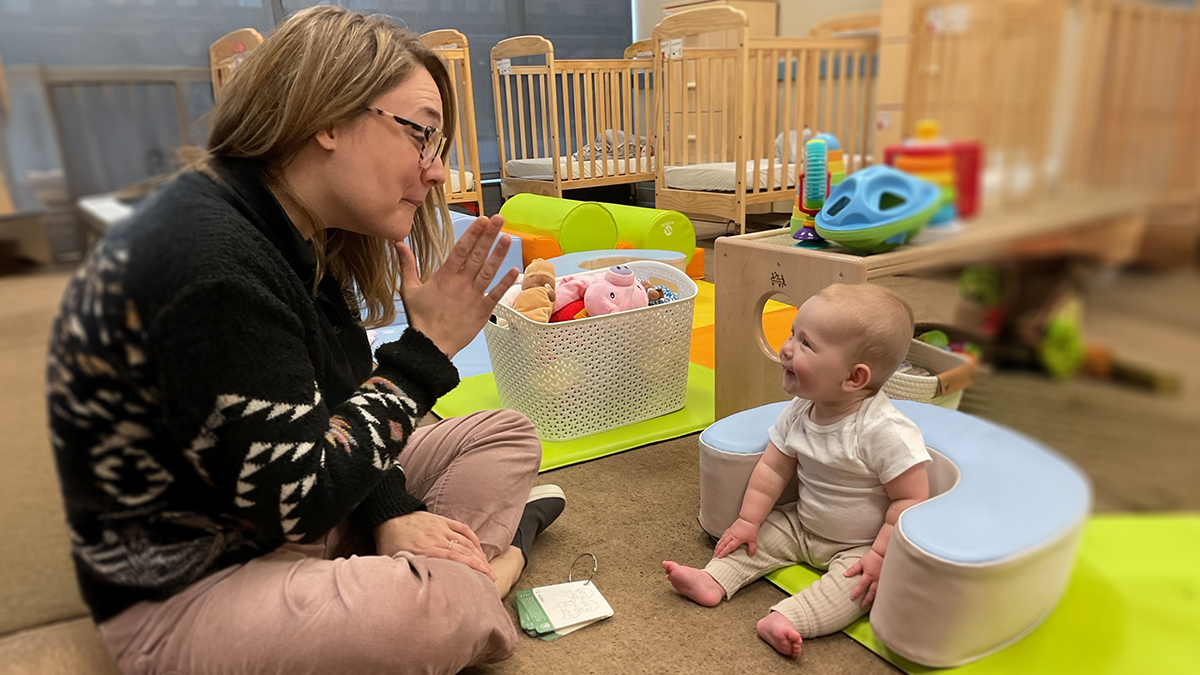
Alexa Booker loved being an early childhood educator. She’d done it for more than 10 years in several center-based programs in Lincoln, Neb. starting with toddlers and then moving to infants, where she spent most of her career.
“I always knew I wanted to go into teaching," Booker said. “I really enjoyed being around little kids. A couple years out of high school, I saw a position for a toddler teacher and I never looked back after that.”
Martina Lucius felt the same pull.
“I always loved children,” she said.
Lucius developed young minds for more than 20 years as an in-home provider, first in South Dakota and later in Scottsbluff, Neb.
Booker recalled memories of a child leaping into her arms during drop-off when the child previously wasn’t comfortable being separated from her mother. Memories of her youngest daughter—now age 8—going to work with her and basically growing up in a child care setting. Memories of many “firsts” she witnessed as an infant teacher. Memories of amazing co-teachers. Lucius remembers the bonds she made with children.
So why in the last year would both Booker and Lucius take on new career paths?
For Booker, it was simple.
“I needed to make more money,” she said.
Her living situation changed and rent increased. Not wanting to leave the job she loved so much, Booker first considered getting a second job, but she didn’t have any luck. As a single mom with two daughters, she knew she had to come up with another solution—one she never thought she’d make.
“I always thought, ‘no, I'm never leaving child care. It’s not what I want to do,’” Booker said. “It was very hard to make that decision. I still struggle with it. It was hard, but I need to support my family.”
In Nebraska, more than 74% of children under age 6 live in homes where all adults work, which is higher than the national average. And as is the case across the country, Nebraska has a lack of access to affordable quality care, with a gap of 17,568 spots.
Working conditions for early childhood educators are only compounding this issue. The field already has high turnover rates and teacher staffing shortages. Now employees are leaving, not because they want to, but because they have no other choice.
Lucius had different reasons for taking a new job, but pay and benefits were on the list.
“Child care is hard,” she said. “There are no benefits like 401K or insurance.”
 Martina Lucius
Martina LuciusPlus, it was hard to recover from the pandemic. She lost her full-time assistant and 10 of the 12 children in her care.
Lucius was inspired and motivated by her work as a member of the Buffett Early Childhood Institute’s Nebraska Early Childhood Workforce Leadership Cadre, which aims to build the leadership skills of early educators. She went back to school to get a degree in social work and now works for the Nebraska Department of Health and Human Services.
Her in-home program is still open—she now serves as the director—but she’s no longer teaching children every day.
Booker’s new role took her even farther from the children she loved to teach. She’s now an administrative assistant at a law firm.
“It was not an easy decision,” Booker said. “I didn’t want to leave the field, it’s where my passion is. I get so much joy out of working with children. Sharing the joy of their experiences ... I worked with babies so everything is new to them,” Booker said, holding back tears.
Nationally, early educators are paid a median wage of $13.07 per hour and many lack benefits such as retirement plans, despite the instrumental work they do.
“There’s such a disconnect. We’re building brains. Teaching skills,” Booker explained. “Doing basic care routines, implementing curriculum, reading books, singing songs. Even when we’re changing diapers, we’re interacting with them.”
And it’s not just one baby. In Nebraska, ratio regulations for child care centers allow one adult to care for up to four babies.
“Parents say all the time, ‘I just have one at home. I can’t image how you do it,’” said Booker.
Some states are considering increasing the ratios to help solve the child care crisis, which is dangerous and counterproductive, according to a recent report from the Buffett Institute.
So, what will help?
Improved pay and benefits, for starters.
“Getting a 401K,” Lucius said. “People might say you can put money away. You can’t put money away ... it’s hard to have a savings (account). And getting help with benefits.”
Lucius mentioned issues with claiming child care subsidies and allowing providers to claim by enrollment, not attendance—a topic of conversation in legislative bodies around the country, including Nebraska.
Other benefits could include incentives for staying in the field and student loan relief.
Many states are making improvements, with and without progress at the national level.
In Connecticut, state leaders approved legislation to create a $300 million preschool endowment fund that would cut child care costs for families, guarantee adequate wages for early educators, and create thousands of new preschool slots. Kentucky became the first state to make child care workers eligible for subsidies to receive discounted care for their own children regardless of income.
Vermont passed a bill to invest $125 million annually into child care. New Mexico doubled its investment in early childhood education to $500 million. Montana established the state’s first dedicated fund for early childhood.
“If there was one thing that really we could invest in to make sure our preschool programs are high-quality, it would be investing in the adults that are in that room every single day with those children,” Buffett Institute Executive Director Walter Gilliam said at an early childhood roundtable in Connecticut. “And primarily that means paying them well."
All around the country, people are starting to understand that child care is core infrastructure and key to a strong economy.
“You can’t go to work without us.” Booker said. “We play a very pivotal role in society.”
Another thing that could make a big difference that doesn’t cost anything? Respect and support.
“We’re not just day care. I’m not just babysitting,” Lucius said. “We’re not just sitting there playing all day, not doing anything. I'm loving them, I'm teaching them, I'm caring for them, providing them with education. I wish people understood that.”
Both Booker and Lucius would love to go back some day.
“I still love it. I just miss the bond that you have with children, I miss seeing excitement on their faces,” Lucius said.
“I would love to go back, but I can’t make it work anymore,” Booker said. “That’s the main reason I left, because I couldn’t make it work financially.”
Maybe someday, when her children are older and out of the house and her financial situation has changed.
But someday is a long time to wait to solve the issues. And in the meantime, it’s the children and families that suffer the most when trusted caregivers leave.
“It’s hard, to move into another position,” Booker said. “It's not what I expected. The first few weeks were weird. So quiet. Where's all the noise? I wish things were different enough so that I could have stayed. It really broke my heart to leave.”
Erica Sesay is the associate director of communications at the Buffett Early Childhood Institute. In this role, she manages the day-to-day operations of the communications unit and leads events, project management, internal communications, database creation and management, and more.

